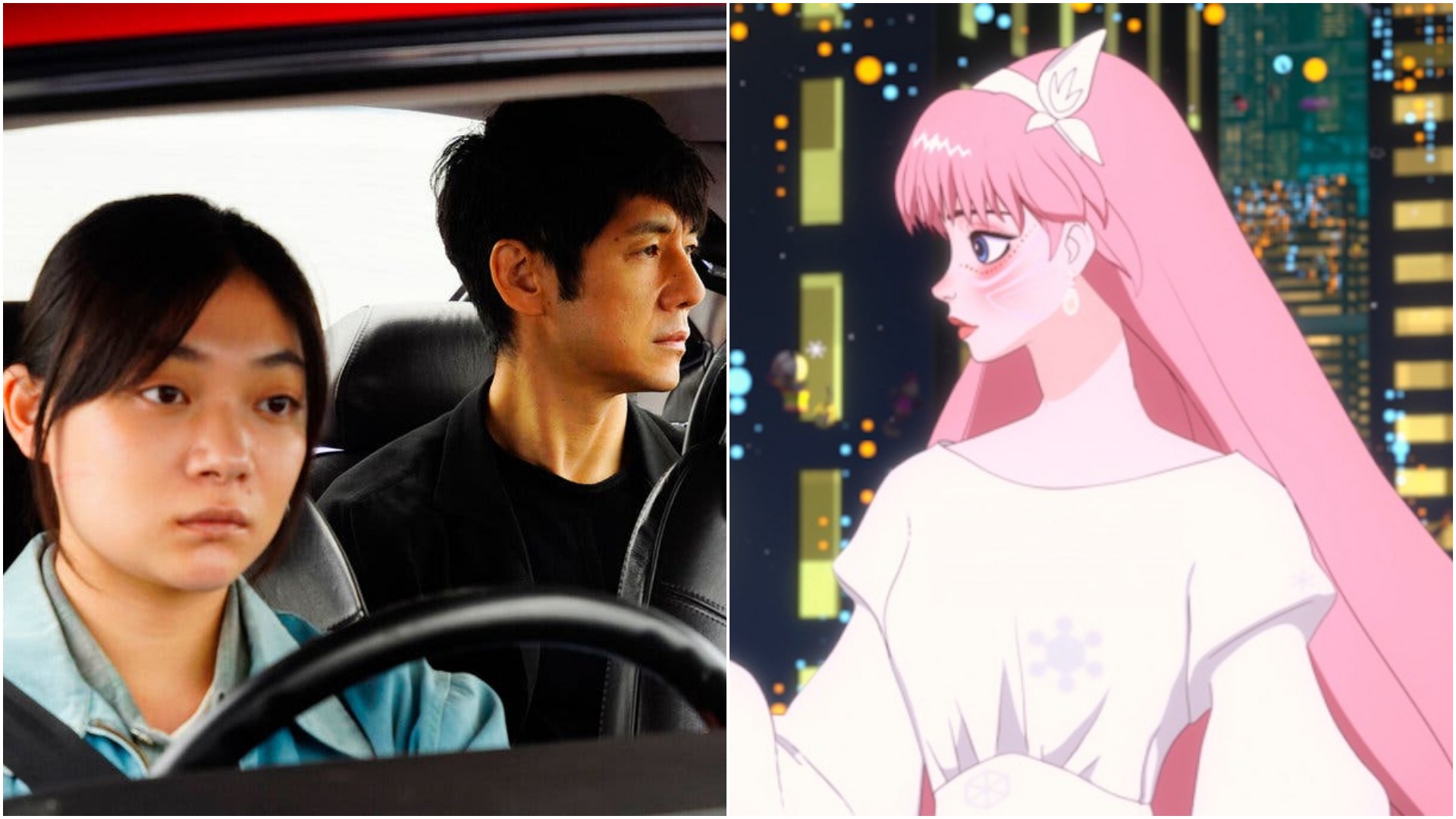2:03 PM CST on January 20, 2022

Tôko Miura and Nishijima Hidetoshi in ‘Drive My Car’; Belle in ‘Belle’
A woman (Reika Kirishima) sits up in bed, her nude body silhouetted from behind, and tells the man beside her a story. It’s about a girl who sneaks into a boy classmate’s house every day, and it’s not clear whether the storyteller is free associating, exploring a private fantasy, or speaking in code to share some otherwise unexpressed truth about her relationship with the man. Oh, also, at some point in the story the girl transforms into a lamprey.
Before the credits for Ryûsuke Hamaguchi’s Drive My Car appear on screen, about 40 minutes into the three-hour film, this woman will have died suddenly of a brain hemorrhage. Her name is Oto and she’s a TV screenwriter who composes her plots aloud during or just after sex; the man is her husband, Yûsuke (Hidetoshi Nishijima), who relays her tales back to her dutifully the following morning. The abrupt ending to Oto’s life story not only leaves him alone, but saddled with an unresolvable cliffhanger.
“I want to explore unconventional ways to communicate with others,” the leader of a new-agey body movement workshop announces in Happy Hour, Hamaguchi’s five-hour 2015 breakthrough film, and you couldn’t ask for a more direct statement of the writer/director’s goals. The two movies he released this year, the commercially backed Drive My Car and the indie-financed Wheel of Fortune and Fantasy, dramatize (and revitalize) the somewhat cliché paradox that art can feel more real than life, as characters habitually submit themselves to roles in someone else’s story and emerge transformed. In Wheel of Fortune and Fantasy, a woman attempts to seduce her professor by reading a sex scene in his novel aloud, and two women who meet by chance alternately impersonate each other’s high school crushes to make peace with their pasts.
In Drive My Car, it’s a unique production of Chekhov’s Uncle Vanya that allows an international cast of actors to achieve unexpected realizations about themselves. The film rests on the supposition that we don’t get to choose who we become close to, or the ways in which we become close, or the results of that closeness. And the key to its effectiveness may be those delayed credits, which set Oto’s life apart from the rest of the film as prologue. The easy alternative, the sort of explainery flashback sequences that are way too much in vogue these days, would have provided an inaccurately vivid and too logically structured semblance of memory. Instead, Yûsuke's emotional discoveries remain ambiguous—to us and maybe him as well.
When not serving as Oto’s erotic stenographer, Yûsuke is an actor and director who stages multilingual versions of stage classics. He’s preparing for the title role in Vanya at the time of his wife’s death; Oto had recorded all the other parts on a cassette for him, and he practices his lines in response as he drives around in his red Saab 900 Turbo. Once she’s gone, he’s left with her voice reciting someone else’s words, and the only way he can still talk to her is by responding in the voice of the play’s pathetic protagonist. When he attempts to act the role onstage, he breaks down mid-performance. As he explains later of acting Chekhov, “When you say his lines, it drags out the real you.”
Two years after Oto’s death, Yûsuke accepts a residency in Hiroshima, where he is to direct (what else?) Vanya, though he declines to perform the lead role himself. He gathers an international cast, including a Korean actress named Lee Yoon-a (Yoo-rim Park), who is mute and performs in sign language. The young TV star Takatsuki (Masaki Okada), who’d become Oto’s lover during her final production, resurfaces, disgraced after a sex scandal with a minor. (Wherever he goes, bystanders irritate him by indiscreetly snapping photos.) He immediately reveals more depth (and rage) than his himbo demeanor suggests, auditioning with an undeniable sexual force. Yet Yûsuke shoehorns him inappropriately into the play’s title role, for unknown reasons. To emasculate his virile rival? To challenge him artistically? Because he sees a genuine artistic spark?
Yûsuke also asks the residency administrators for a far-off lodging, so he can be alone with his wife’s voice on his commute. But his handlers have other plans, and they foist a chauffeur on him, a taciturn young woman named Misaki (Tôko Miura). As the logic of movies require, these two incompatible strangers will learn something about each other, but in a more roundabout way than is conventional. She observes his relationship with others—as he and Takatsuki share their memories of Oto, as he dines at the home of Lee and her husband, and as the production of Vanya takes shape—until she is ready to exchange secrets with him.
Drive My Car isn't a beautiful movie. There’s something modern but functionally bland about the world of blank faux-granite hotel walls and sterile conference rooms the actors move through, and much of the movie is spent driving along Japan’s highways. A car’s interior is hardly the most immediately cinematic of settings but it’s a dramatic hothouse, a place where conversations can’t be ducked out of. And after dark, the primary colors of the highway lights dance eerily across the passengers’ faces, the moody flickers suitable for late-night revelations.
As Yûsuke, Nishijima is impassive without being aggressive, his face solid like a lump of clay that hardens and softens as the mood requires. His directing style is just as you’d expect from the sort of person who’s reluctant to hand his car over to another driver. He’s rigorous, drilling his actors to repeat their lines while seated till they match his rhythm. (“We’re not robots,” one protests futilely.) But he’s right—the discipline opens the actors up, just as the routine commute brings him closer to Misaki and the ritual both men shared with Oto connects him with Takatsuki.
The film is itself an indirect work of collaboration with other writers, though Hamaguchi reworks their material for his purposes. There’s Vanya, of course—Drive My Car may not entirely assume that you’re familiar with the play, but it expects you to be patient enough to learn its themes through briefly acted scenes. Yet Hamaguchi doesn’t seek out the dark comic tone of Chekhov, and Drive My Car lifts only scraps of narrative and some character names with the Haruki Murakami short story with which it shares its title. (It does mix in themes from two Murakami stories.) Most significantly, for Marakumi’s Yûsuke, a role gives an actor something to hide behind, a way to disappear. Hamaguchi flips that traditional idea around entirely. Embraced fully, Yûsuke discovers repeatedly, art makes it impossible to hide—least of all from yourself.
Now can someone please screen Wheel of Fortune and Fantasy locally?
If you can discover yourself through Chekhov, then why not by inhabiting the avatar of the biggest pop star in a virtual reality universe? In Belle, the latest animated feature from Mamoru Hosoda, U is a platform that bills itself as “the ultimate virtual community.” “You can’t start over in reality, but you can start over in U,” is its slogan, which sounds creepy as hell to you and me because we live in much darker actual and virtual worlds than Belle offers. Hosoda’s digital Oz is so quaintly techno-utopian by 21st century standards that the biggest danger it faces is basically that mods might too zealously enforce rules against trolls. Imagine!
Belle centers on a shy Japanese teen named Suza (voiced by Kaho Nakamura), who hasn’t been the same since her mother died saving another girl from drowning. Once obsessed with music, Suza can’t even sing without puking now. When her friend Hiro (Lilas Ikuta) invites her to join U, Suza dithers but eventually copies her look from the most popular girl in class and blossoms digitally into the title heroine, in all her pink-maned, wide-eyed, infinitely leggy anime perfection. With Hiro as her mastermind, Belle becomes U’s next big thing.
Hosoda has crafted a suitably dazzling virtual reality. We travel through seemingly infinite digital lattices as though compelled by the physics of a kaleidoscope, and breeze past a population of fanciful creatures, most of whom (true to life) spend their time in U just gawking. Outside, the noise of social media sputters recognizably, with Belle as hated as she is loved. That’s how it’s supposed to work, Hiro assures Suza, but the strain of maintaining a secret identity wears on our hardly resilient heroine.
And U is not without danger. The peace of the community is threatened by the Dragon (Takeru Satoh), a creature who slams his opponents with such malevolent force they’re reduced to pixellated blocks. After the Dragon interrupts Belle’s big concert, she becomes fascinated with this... well, this beast, and we can all see where this tale as old as time is headed. (The Dragon’s foe, a chisel-jawed law enforcer armed with what’s essentially a doxxing ray and backed by an array of corporate sponsors, is wonderfully called Justin, as though Gaston + justice = the ultimate whiteboy pop idol name.)
As Suza tries to learn the Dragon’s true identity, so she can protect him from being unmasked by Justin, she and her classmates go about their everyday life in the non-U world. Their adorably red-faced, gape-mouthed attempts at flirting are among the movie’s high points. (These scenes certainly have a nuance lacking in Belle and the Dragon’s scenes together, which often detour into Disneyish familiarity.) And though the Dragon’s origins rest in real-life violence, the stakes here remain thankfully human-sized. Neither world faces an existential threat—they simply overlap unevenly, as our own virtual worlds do. And the Beauty and the Beast flip resolves on a relatively progressive note: Though the onus of detoxing brutish masculine torment falls as ever on the pure-hearted woman, Suza prevails through determined heroism rather than pledging her love.
In the end, Suza discovers, as Glinda the Good Witch might have told her, that she had the power all along: Her own internal qualities are what created Belle. Belle strikes a balance between the demands of “real life” and creative potential of fantasy, never celebrating drab authenticity at the expense of the imaginative. Forget the U slogan, the conclusion suggests: You can start over in reality too. Like the saccharine J-Pop songs that make its title star a virtual phenomenon, Belle is pretty and earnest and moving—the movie even closes with a shot of the sun emerging from the clouds. And what’s wrong with that? Ain’tcha ever heard of a fairy tale?
Drive My Car open at the Heights Theater tomorrow, January 21; Belle is already in area theaters.
Special Screenings This Week
Thursday, Jan. 20
Ferris Bueller’s Day Off (1986)
Parkway Theater
“The greatest movie of all time” — George F. Will, Washington Post. 8 p.m. More info here.
Friday, Jan. 21
I Know Where I’m Going! (1945)
Trylon
OK! No need to shout! Jeez! $8. Friday-Saturday 7 & 9 p.m. Sunday 3 & 5 p.m. More info here.
Days (2021)
Walker Art Center
Featuring almost no dialogue, Tsai Ming-liang’s latest slow cinema masterpiece is hypnotic, lulling, wrenching, and tender. Not for everyone—just the sexy people who like staring at an uneventful series of long static shots. Also Saturday. $12. 7 p.m. More info here.
Saturday, Jan. 22
The Goonies (1985)
Alamo Drafthouse
Your childhood was a lie. Move on already. $10. 6:30 p.m. More info here.
Stand By Me (1986)
Parkway Theater
This is the one where Morgan Freeman plays the crazy principal with the baseball bat, right? $5-$10. 1 p.m. More info here.
Sunday, Jan. 23
Pride & Prejudice (2005)
Alamo Drafthouse
In this economy? $10. 11 a.m. More info here.
Bolshoi Ballet: Jewels (live)
AMC Eden Prairie 18/AMC Rosedale 14
A “glamorous triptych,” it says here. $19.33. 11:55 a.m. More info here.
Casablanca (1942)
AMC Rosedale 14/AMC Southdale 16/Emagine Willow Creek
Celebrating the classic’s 80th anniversary. Time sure does go by. $14.61. 4:30 & 7:30 p.m. Wednesday 4 & 7 p.m. More info here.
Purple Noon (1960)
Trylon
René Clément’s adaptation of The Talented Mr. Ripley stars the only actually attractive French actor, Alain Delon. $8. 7 p.m. Monday-Tuesday 7 & 9:30 p.m. More info here.
Monday, Jan. 24
Breezy (1973)
Alamo Drafthouse
You know that movie Alana auditions for in Licorice Pizza, opposite Sean Penn’s “Jack” Holden? This is it. $10. 7 p.m. More info here.
Tuesday, Jan. 25
The Lord of the Rings: The Return of the King: Extended Edition (2003)
Alamo Drafthouse
Extended? How much longer can it get? $10. 6:30 p.m. More info here.
Opening This Week
Flee
The mostly animated, critically acclaimed story of a gay man who escaped Afghanistan as a child refugee.
The King’s Daughter
Not to be confused with The King’s Man. At least I don’t think so.
Redeeming Love
Oh no! A “faith-based” tale of the California Gold Rush.
The Souvenir: Part II
Absolutely honest truth: I have not been this excited for a sequel since The Empire Strikes Back came out when I was 10.
The Tiger Rising
The tiger/He destroyed his cage/Yes/YES/The tiger is out.
Ongoing in Local Theaters
American Underdog: The Kurt Warner Story
Ghostbusters: Afterlife (read our review here)
House of Gucci (read our review here)
The King's Man
Licorice Pizza
Nightmare Alley (read our review here)
Parallel Mothers (read our review here)
Scream
Sing 2
Spider-Man: No Way Home
The 355
The Tragedy of Macbeth (read our review here)
West Side Story (read our review here)
Read More:
Stay in touch
Sign up for our free newsletter
More from Racket
Two Harbors Man at Center of Alleged $46M Renewable Energy Swindle
Plus charges filed against alleged Nudieland killer, Icehouse faces eviction, and students arrested for peaceful protesting in today's Flyover news roundup.
It’s Your Very Last Complete Concert Calendar for April 2024: April 23-29
Pretty much all the live music you can catch in the Twin Cities this week.
THC Coffee: Not Your Friend’s Older Brother’s Wake ‘n’ Bake
THC cold brews from locals Venn Brewing and Gus Dean Coffee are all the buzz.
There Were Too Many People at the Waxahatchee Show!
This was not the ideal way to experience the mild turmoil of Katie Crutchfield's country-rock.
Everyone Is Being Super Normal About Isra Hirsi’s Arrest
Plus RIP Sammy McDowell, MN's new Supreme Court judges, and a Best Buy throwback in today's Flyover news roundup.




